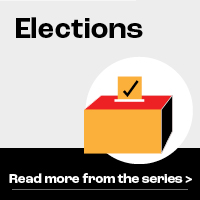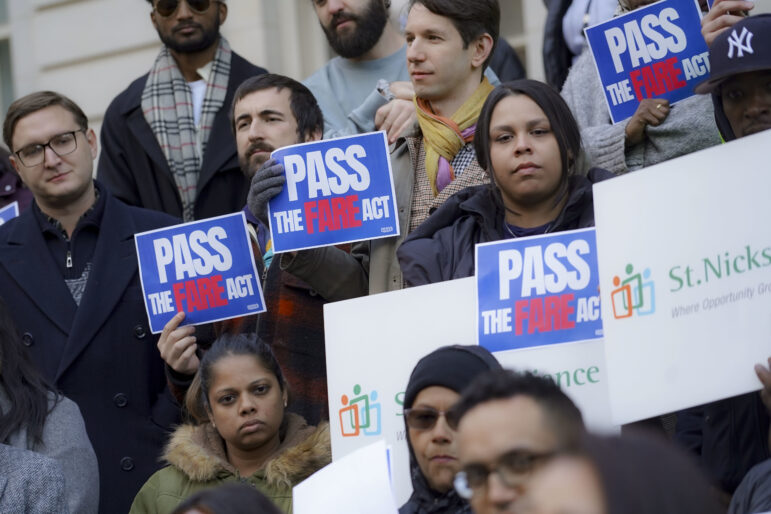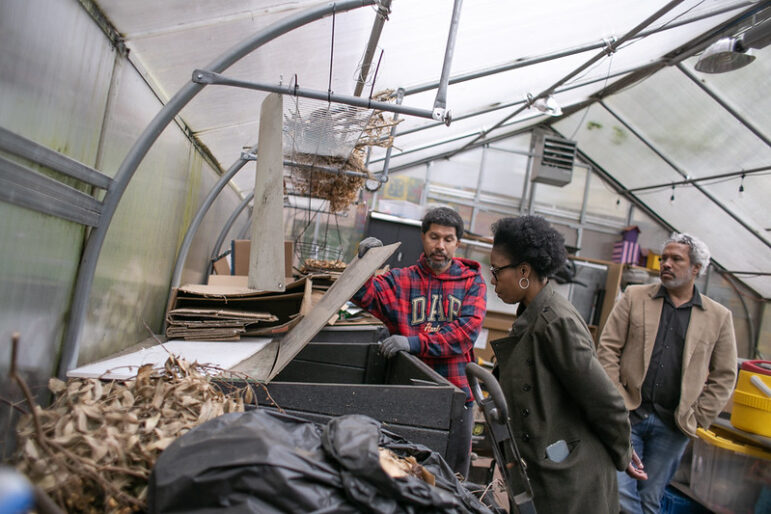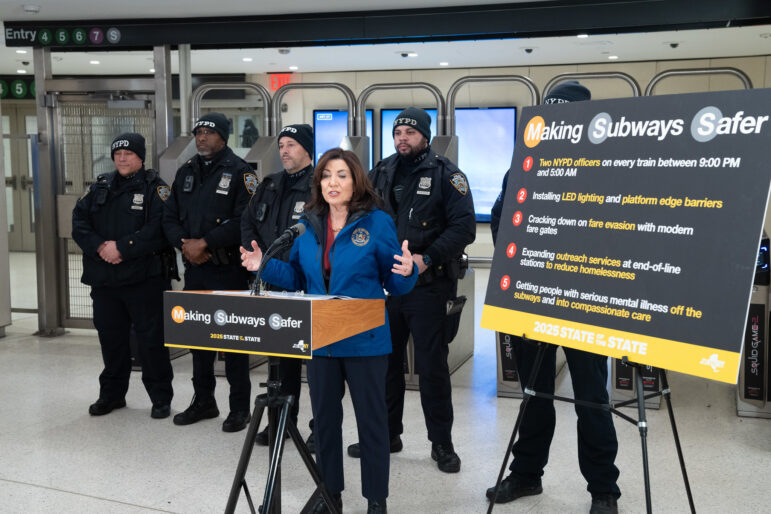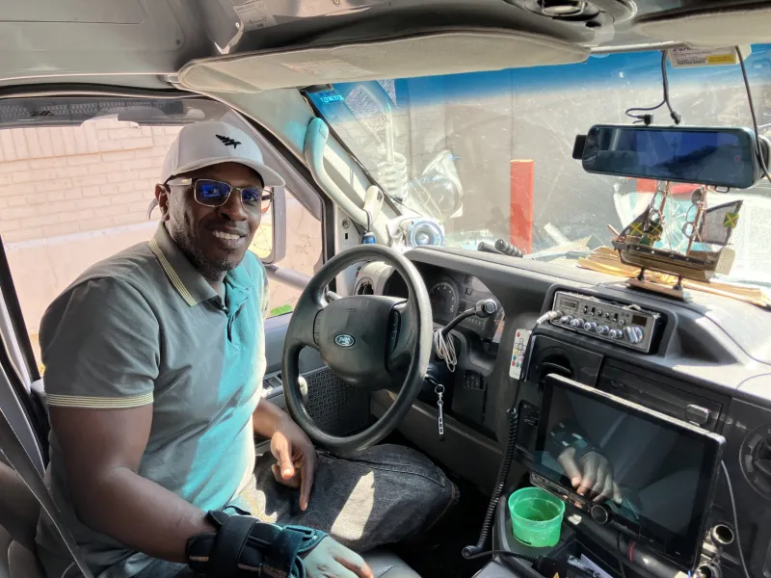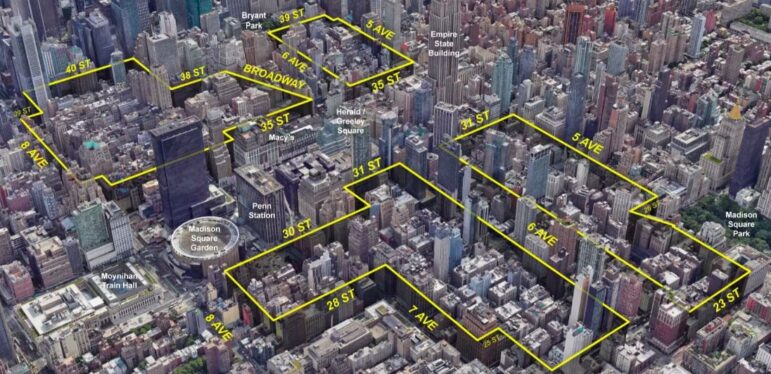In the race to replace Councilmember Fernando Cabrera, money won’t matter as much as grassroots support, and one candidate is pitching a new way to share power in the Bronx.
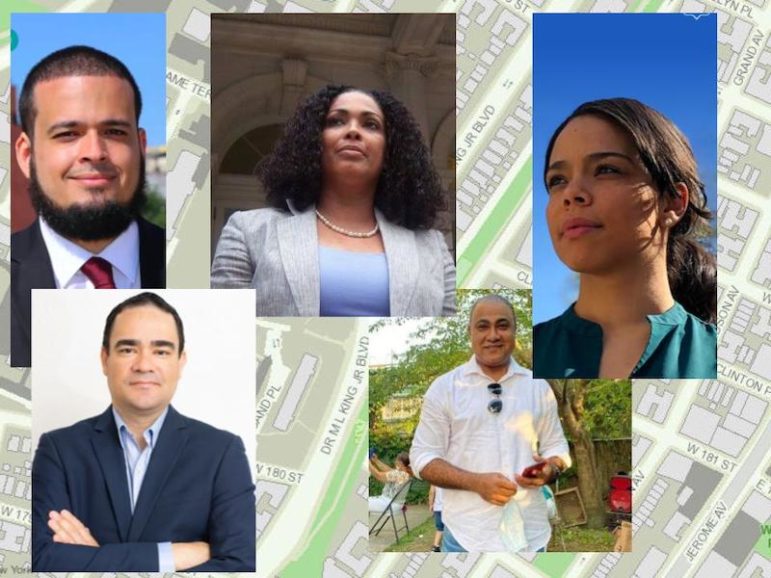
Various campaigns
The candidates, clockwise from top left: Adolfo Abreu, Yudelka Tapia, Pierina Sanchez, Fernando Aquino and Haile Rivera.Differing visions of what it means to be progressive are on display early in a crowded race for a Bronx City Council seat.
Until recently, the field in the 14th district—which covers the neighborhoods of Morris Heights, University Heights, Fordham and Kingsbridge—included Fernando Aquino, a former spokesman for the state attorney general; one-time Obama campaign staffer Haile Rivera; Pierina Sanchez, a former de Blasio administration staff member who now teaches at Pratt; and Yudelka Tapia, a Democratic district leader for the past decade.
Last month, Adolfo Abreu, the director of organizing at the Northwest Bronx Community Clergy Coalition, jumped into the race.
In 2021, two-thirds of the City Council will turn over thanks to term limits. The open seats, and a new $8-to-$1 matching rate for candidates who participate in the city’s public financing program, are likely to draw a record number of candidates to the contest.
That, plus the movement of the primary from September to June, the lingering effects of the pandemic and the arrival of ranked-choice voting all make outcomes especially hard to predict. The 14th district race looks like it will hinge on name recognition, grassroots cred and—perhaps—message. The other 33 open Council races likely will too.
Fighting over a handful of votes
The 14th district has been represented since 2010 by Fernando Cabrera, a conservative minister. Cabrera lost races for the State Senate in 2012 and 2016. Denouncing Alexandria Ocasio-Cortez’s embrace of democratic socialism, was briefly a candidate against her this year. He is now running for borough president.
According to the state Board of Elections, more than 60,000 active registered Democrats live in the 14th, but in 2017 barely 7,000 came out to vote in the primary—turnout of 11.5 percent, which was actually a slight improvement over the previous cycle. By way of comparison, the 2017 primary in the Upper West Side’s 6th district brought out nearly 21,000 voters. That means the five contestants in the 14th district race are battling over a relatively smaller number of votes.
Under ranked-choice voting, should no one claim a majority on the first round—and it seems likely no one would—the race would come down to whom voters designated as their second, third or fourth choice.
All five candidates to replace Cabrera are Dominican, giving them direct standing with a crucial constituency in the district. Sanchez ($66,000) and Aquino ($39,000) have raised the most money so far; Abreu has not yet had to report his fundraising numbers to the Campaign Finance Board, but says he’s pulled in more than $30,000. While Rivera ($16,000) and Tapia ($14,000) trail, it is likely that all candidates will qualify for matching funds, which means they will have to abide by a spending cap. In other words, money is not likely to be a decisive factor.
Tapia, the veteran district leader, would seem to be the candidate of the Bronx Democratic organization, but that apparatus is in transition after leader Marcus Crespo announced his resignation earlier this year, so it is possible the machine will back someone else.
Aquino has the support of trade organizations for owners of bodegas, supermarkets and taxis. Whether business support translates into votes in this district is uncertain.
Indeed, in interviews with City Limits, all five candidates stressed the importance of resumés and grassroots support.
“It comes down to that same thing as when you are applying for a job. We’re all going to promise you the same thing. I know all the candidates, some more than others, and their hearts are in the right place At the end of the day, judge people by what they have done: What have you been doing?” says Rivera.
What they’ve been doing
Aquino was a City Hall reporter covering mayors Dinkins through Bloomberg and then served as a press secretary for the State Senate Democrats before a stint as a Mets executive and a stretch as spokesman for state Attorneys General Eric Schneidermanm Barbara Underwood* and Letitia James. He is an adjunct professor at Lehman College, teaching courses on civil rights and the immigrant experience.
Rivera worked on Barack Obama’s 2008 presidential campaign, then returned to the Bronx, where in 2010 he volunteered for State Sen. Pedro Espada Jr.’s re-election campaign and worked as a staffer in his Senate office*—a move that alienated him from many progressives. Espada, a notorious opponent of tenant protections, later went to federal prison. Rivera says he committed to Espada before other candidates, including the progressive who beat Espada, Sen. Gustavo Rivera, entered the 2010 race. “My daughter had been born. I needed health insurance for her. I needed a job at that particular moment in time,” he says. “I don’t think it’s fair to be judging folks by what their bosses did.”
Since then, Rivera has worked for the Dominican Consulate and as a consultant for supermarkets.
Tapia placed a distant third in the 14th district in 2009. She ran in 2013 for a different Council seat but withdrew and didn’t make the ballot. But she has been an elected district leader since 2010. She emigrated to the U.S. when she was 20, and works for the city comptroller as an auditor. “I characterize myself as a progressive woman, an Afro-Latina woman. In my country I was a progressive and when I came here I saw the fights are the same,” she says. She feels she has personal experience of many of the issues that the candidates will talk about. “I have intimate knowledge of it. I’ve been evicted once. I understand what those issues are.” Three of her children were diagnosed with kidney disease at a young age—one had to have a transplant—and her older son has been incarcerated. “If you talk about healthcare and incarceration, everything I have lived. So if you are talking about progressive, I have lived it.”
The most extensive record of government service belongs to Sanchez, a Bronx native with degrees from Harvard and Princeton who worked for Cabrera for two years and, after a stint at the Regional Plan Association, became Mayor de Blasio’s Senior Advisor for Housing, Economic Development and Labor. She’s now a senior fellow at the Pratt Center for Community Development. She believes the race will attract more interest this year.
“We saw with the Congressional race that nobody really knows what the best strategies are,” she says, “but given that it’s going to be a mayoral election year, given that there are going to be so many seats up around the city, I do think there’s going to be what we’ve been seeing in recent years: a higher level of voter turnout and engagement.”
Union support and other endorsements will matter. Abreu has already won the backing of TenantsPAC—one of four Council candidates the organization tabbed in a round of early endorsements.
Michael McKee, the treasurer of TenantsPAC, told City Limits that Abreu’s familiarity was his appeal. “Almost all board members know Adolfo and have worked with him in Housing Justice for All campaigns the last few years,” he said. Plus, he’s an organizer. “We think it is important to have more organizers in elected office.” The PAC decided not to interview anyone else.
Platforms share priorities, differ on depth
The candidates all identify housing as the top concern for district 14.
“Looking at the future and knowing that the eviction are going to be coming down the pipeline and you tie that into the need for housing,” Rivera says. He believes the most pressing questions concern the impact of the 2018 Jerome Avenue rezoning, which is slated to create new residential capacity. “Who gets those apartments? Is it really the folks who are living in the district, in the community?”
Sanchez, who teaches a course on gentrification at the Pratt Center (and received a $500 donation from Vicki Been, the deputy mayor for housing and development), says she feels the city needs a different approach to housing.
“I think the housing crisis is not a crisis of supply and demand. Sure, supply is part of it. But it is a crisis of wealthy inequality,” she says. Cancelling rent is what’s needed in the short term. “But when you see the crisis as a crisis of inequality, your solution set looks different.” As Councilwoman, she says she’d scrutinize the details of the city’s affordable-housing development, and use the Council’s power over the budget to push a model of ownership over renting. “It’s really about building equity—building wealth among communities.”
Aquino says he will “oppose any further rezoning that relies solely on private investment” to create housing. He emphasizes community land trusts, social housing and land banks.
Tapia thinks there might be room for another rezoning in the northern part of Jerome Avenue in the district, which was not part of the previous rezoning. “We’re going to have to be creative,” she says. Economic development is critical, she adds, because the housing crunch is really an income problem. “Before the pandemic, 62 percent of our people were paying more than 50 percent in rent. Imagine now. That’s the biggest thing we’re gong to have to deal with—the chokehold of this pandemic.”
Although he is the newcomer to the race, Abreu has offered the most detailed policy platform, and housing leads it. Among other things, he calls for the city to “protect homeownership by investing in small owner-occupied buildings, housing development fund corporations (HDFCs), and cooperatives to be financially and physically sustainable for low-income residents.” He also calls for full funding for NYCHA. In an interview with City Limits, Abreu says he has doubts about the de Blasio administration’s current plans for public housing, which he feels have failed to engage residents.
To varying degrees, the candidates steer away from calls for steep reductions to funding for the NYPD, or the more radical step of abolishing it. “I don’t think fighting crime and fair policing are mutually exclusive,” Aquino said.
Tapia believes that civilianizing traffic enforcement would permit a large reduction in the NYPD’s budget footprint; she also believes the city must invest more in re-entry and violence interruption programs.
“Procurement reform is a super-non-sexy way to save money,” Sanchez says, believing there is still room within NYPD spending to divert money to community programs without harming safety. “There is still a multibillion-dollar budget.”
Rivera believes the focus should be on individual cops who are racist, not on the nature of policing itself. “Our communities are suffering because now, by the time you get the police, someone might be dead already. We see crime increase and we know why,” he says. Speaking of the mayor and Council, “I think they played with [public safety] and I think that’s not something you do lightly.”
A different approach
While Abreu offers a fairly detailed platform—one that, on some points, goes beyond what a Councilmember might hope to deliver—his most interesting proposal concerns how he will approach the job. He casts himself less as a candidate aiming to put his policy goals into action, and more as a conduit for community sentiment.
“Community members pushed me to run. We need people who are accountable to us,” he says, “which means a commitment to co-governance and governing together, a way for us to build power and legislate.” His vision goes beyond participatory budgeting, where the community helps direct a portion of a councilmember’s discretionary spending. “You have to take it to the next level,” he says. “The people who are most affected need to be close to decision making.”
This is a departure from the traditional concept of representative democracy, where elected officials who are engaged full-time in the work of government make decisions based on their own principles and politics. It’s a move toward a form of direct democracy. “I think ultimately that is how we destroy the status quo and construct our boldest vision,” he adds. “What we’re doing now isn’t working and is not sustainable. We need to approach it through a different lens.”
The tricky thing about that novel approach is that it’s often not easy to get consensus—or be sure you are hearing all sides—in a district comprised of multiple neighborhoods, ethnic groups and socioeconomic tiers. The complexity of some policy decisions could make that especially difficult.
Yet Abreu argues that, as an organizer, he learned how to “guide people directly through a conversation to get to a shared goal,” and he believes that approach can work for the Council. It requires developing leaders at the grassroots who can be voices for their neighborhoods—just as he was developed as a teenage activist and member of Sistas and Brothas United.
Abreu’s employer, the Northwest Bronx Community and Clergy Coalition, is a deeply established presence in the neighborhood. (Full disclosure: I live in the area and was briefly a member of the organization in the early 2000s.) As a 501c3, it cannot directly participate in politics, but its members have been involved in other recent campaigns. Most recently, in 2017, allies of the organization backed rookie candidate Randy Abreu in a challenge to Cabrera; Randy Abreu, who is not related, to Adolfo, got just over a third of the vote.
This year, allies and associates of the Northwest Bronx are finalizing the creation of a 501c4 that will be active in electoral politics.
*The article was updated to clarify the nature of Rivera’s work in late 2010 and to correct elements of Aquino’s biography.


